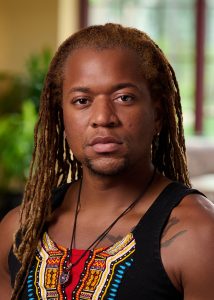
T. Anansi Wilson, founding director of the Center for the Study of Black Life and the Law at Mitchell Hamline.
The Center for the Study of Black Life and the Law gained faculty approval in October, officially making it the newest center at Mitchell Hamline School of Law.
Founding Director T. Anansi Wilson has been developing the center since 2020 and convening lectures, academic symposia, and community events in furtherance of its mission – to be a national repository for both theory and policy on how laws and legislative proposals affect Black life.
A symposium earlier this year featured experts from South Africa and across the United States, and the events – some of which have occurred in other areas of the country – have included noted scholars, including New York Times best-selling author and Princeton Professor Imani Perry.
The center will also offer curriculum to both Mitchell Hamline students and the wider community; host speakers and events; and be a gathering place for community members and artists. A gala celebrating the official launch of the center is being planned for February 2023.
“This center is unquestionably unique, if not historic, among law schools,” said Wilson, an associate professor at Mitchell Hamline. “We’ll be the first – but hopefully not the only – center specifically focused on the study of Black life and the law.
“If you look across the country, you’ll see a racial justice center here, a social justice center there, a race law and sexuality center here. But nothing audacious enough to be specific about the needs of Black folk. About the lives of Black folk. About the deaths and striving of Black folk.”
In the 10 years since the killing of Trayvon Martin, Wilson says, the racial reckoning across the country hasn’t just been among white communities but Black communities, seeking deep study into how their lives and their ancestors’ lives have been rendered by the law and the public imagination.
“We’re specifically naming and talking about a long array of racial violence and inequity that has been uniquely targeted at Black folks, and there’s a hunger for that kind of study right now in the country.
“Our goal is to create a focus on the Black light that undergirds black letter law to make this world – make this community – a bit more habitable for the Black folks that live here and for those who love us,” said Wilson, who joined the Mitchell Hamline faculty in the summer of 2021 after earning their Ph.D. from the University of Texas at Austin. They previously taught at the University of California at Hastings College of Law, The Center for Racial and Economic Justice, and Middle Tennessee State University and have delivered lectures at Harvard and Berkeley law schools.
The Center for the Study of Black Life and the Law is the seventh center and institute at Mitchell Hamline, joining the Center for Law and Business; the Dispute Resolution Institute; Health Law Institute; Institute to Transform Child Protection; the Intellectual Property Institute; and the Native American Law and Sovereignty Institute.
“This will be an important part of Mitchell Hamline’s work as an antiracist law school,” said President and Dean Anthony Niedwiecki. “We want to be a place of scholarly and community engagement regarding the dignified treatment of Black and Black queer people under law.”
“The basics of legal education must include space to challenge anti-Black structures that the Constitution and, consequently, lawyers protect,” said third-year student Deanie Hatch ‘22, who enrolled during her final year of law school in Wilson’s course on race, sexuality, and the law. “No legal discipline or niche is immune to weaponizing the law to harm Black bodies, which is why this center is so necessary.”
